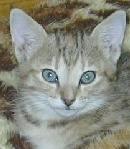

See the M on that cute face? Myoo is my kitten, she will soon be posting her view of the Blue Spot when she moves in on Sunday... Her name comes from various sources, µ is the mathematical symbol for the Greek letter M or Mu, pronounced "myoo", here is more on the meanings of Mu or Myoo... born 19/07/2004
 Mu - taken from a Japanese tea ceremony scroll this calligraphy figure is the Chinese character Mu. Mu is a Zen koan. Mu is the nothingness that is the universe. Mu is the lack of self that is shared by all things. Mu unasks questions. In the hinge of the heyiya-if there is Mu. 無 µ M
Mu - taken from a Japanese tea ceremony scroll this calligraphy figure is the Chinese character Mu. Mu is a Zen koan. Mu is the nothingness that is the universe. Mu is the lack of self that is shared by all things. Mu unasks questions. In the hinge of the heyiya-if there is Mu. 無 µ M1. (character) Mu - (Greek letter).
1. /micro/ prefix denoting division by 10^6, e.g. mu m (micrometre, a millionth part of a metre). Sometimes written as a 'u', the ASCII character nearest in appearance.
2. /myoo/ In the theory of functions, mu x . E denotes the least value of x for which E = x, i.e. the least fixed point of the function \ x . E. The recursive function mu f . H f satisfies (and is defined by) the equation
mu f . H f = H (mu f . H f)
An alternative notation for the same function is
fix H = H (fix H)
See fixed point combinator.
3. multiple value.
4. (networking) mu - The country code for Mauritius.
4. (philosophy) mu - /moo/ The correct answer to the classic trick question "Have you stopped beating your wife yet?". Assuming that you have no wife or you have never beaten your wife, the answer "yes" is wrong because it implies that you used to beat your wife and then stopped, but "no" is worse because it suggests that you have one and are still beating her. According to various Discordians and Douglas Hofstadter the correct answer is usually "mu", a Japanese word alleged to mean "Your question cannot be answered because it depends on incorrect assumptions".
Hackers tend to be sensitive to logical inadequacies in language, and many have adopted this suggestion with enthusiasm. The word "mu" is actually from Chinese, meaning "nothing"; it is used in mainstream Japanese in that sense, but native speakers do not recognise the Discordian question-denying use. It almost certainly derives from over generalisation of the answer in the following well-known Rinzei Zen teaching riddle:
A monk asked Joshu, "Does a dog have the Buddha nature?" Joshu retorted, "Mu!"
[Douglas Hofstadter, "Gödel, Escher, Bach: An Eternal Golden Braid"].

1 comment:
Little Myoo - you are a very cute kitten!
Post a Comment